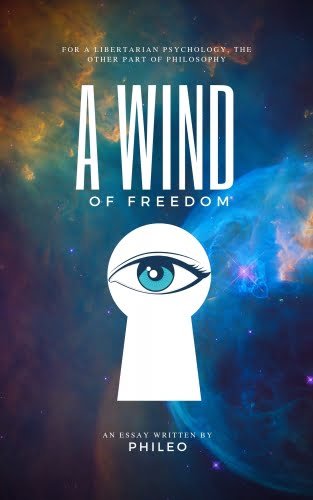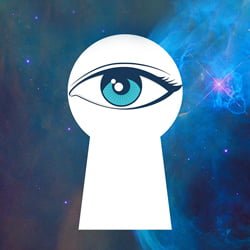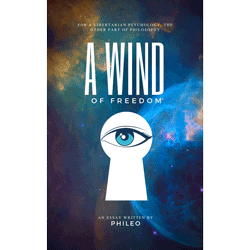A Wind of Freedom by Phileo

A Wind of Freedom
Through this essay, the author describes the psychic human relationships in the world today, which are inscribed in a total human alienation to the Intellect, to the “reasoning” reason which continually leads Man to imitate Nature, to ape it without never equaling to it, to want to possess nature without never being able to control it. And this will to possess and control is exercised in all areas and at levels of all planetary hierarchical systems. Profits and Control of Masses lead the “liberal” Politics of Humanity which is fatally oriented towards a generalized psychic confinement, individually and collectively.
This essay also tries to demonstrate that it is not desirable for man to wait for the achievement of his liberation of all forms of psychic imprisonment taking place from the objectified world. On the contrary, it is through a deep Self-knowledge, by the exercise of the necessary dialogue between his Consciousness and his Unconscious, the founding dialogue of our Psyche (our Soul), which Man will finally reach his Totality (the Total Man).
Book Details
Author: Phileo
Print Length: 49
Publisher: Auro e-Books
Book format: Pdf, ePub, Kindle
Language: English, French
Contents
- Introduction
- Illusions
- Science, Morality, Hierarchy and Social Order
- Cybernetics
- Our Psyche, for a libertarian Psychology, the other part of Philosophy
Book Download (English)
Téléchargement du livre (Français)
Sample
A Wind of Freedom
For my part, there is no hierarchy that suits the human being outside himself, « Each I is the enemy, and would like to be the tyrant of all others » (cf. Pascal, « Thoughts »). Yet, as we can see, it is either natural (animal condition) or it is imposed on us by force by the dominant forces in order to exercise their will for power (Religions-Kingdoms-Empires-States-Multinationals). The first, and the ultimate of hierarchies is necessarily a hierarchy specific to each individual, in itself (once again, it is not a question of responding to his lowest instincts for selfish and meaningless pleasures, for a vulgar hedonism in a way).
The advent of autonomous human consciousness, in a generalized way, can only be achieved through the liberation of individuals from all hierarchical forms: «It is odious for me to follow as much as to guide. Obey? No, never and never govern! Which is terrible in itself, to no one else can inspire terror.» And it is certainly not global economic liberalism (or neoliberalism) that will allow it, quite the contrary.
If, then, the current economic and social order derives from imposed and erroneous beliefs, how can we not think that it is appropriate to correct it, to modify it in its foundations? (I say « correct » and not destroy). Do we not do it for ourselves when we are in error (I do not mean here, for ourselves, a correction that would be imposed by external pressure, by the law, or by the prevailing public morality, knowing that these moral values are never equivalent from one period of history to another. Public morality should never blind us to ourselves, with a view to a higher good, in this way. «True morality makes fun of morality» Pascal thought, and Nietzsche thought: « All psychology has so far remained prisoner of prejudices and moral apprehension, it has not ventured into the depths » (Le Gai Savoir). We have hardly changed, except for the (« modern ») setting thanks to science, always Nietzsche in « Le Gai Savoir » about science: « And now that science has victoriously defended itself against theology, of which it was for too long « the servant », it claims, in its exuberance and carelessness, to dictate laws to philosophy, to play in its turn to the « master », what do I say to the philosopher ».
…
Pascal understood, just as Nietzsche did after him, that man’s nature must necessarily push him towards a deep knowledge of Nature within it: « It is an infinite sphere, whose center is everywhere, and whose circumference is nowhere ». I have difficulty seeing how Reason and Science alone could define this, even less calculate its contours. And we should not forget that Pascal was a great mathematician and physicist. But this time, it was the Philosopher talking to the Physicist!
A Yogi advanced in Knowledge would tell you the same thing, but in a different vocabulary. And we are not talking about God! Pascal again: « I want to paint to him (to man) not only the visible universe, but the immensity that can be conceived of nature, in the enclosure of atomic shortcut ». To enter into oneself, to sink into it until one becomes an « atom » and embrace Nature, its immensity, from all angles. This is what Pascal wanted to show us so much. Just like Nietzsche (and many others). Moreover, in the introduction to the book « Psychology of Kundalinî Yoga », Sonu Shamdasani reminds us that according to the Tantric conception, « the human body is the microcosm of the universe ».
…
About Author: Phileo
 The author is an independent libertarian philosopher (he was a poet also 15-20 years ago) who traveled in many Asian countries (India, in particular) and who lives nowadays in Vietnam.. [Contact author].
The author is an independent libertarian philosopher (he was a poet also 15-20 years ago) who traveled in many Asian countries (India, in particular) and who lives nowadays in Vietnam.. [Contact author].


Leave a Reply
Want to join the discussion?Feel free to contribute!